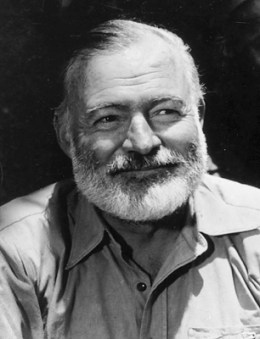
1954: American novelist Ernest Hemingway (1899 - 1961)
Think back to when you read A Farewell to Arms, probably in a high school or college English class. You paged through (or skimmed the CliffsNotes of) the classic story of a World War I ambulance driver who falls in love with a nurse all the way up until the end, when — spoiler alert — both the nurse and the child she carried died.
Now, Ernest Hemingway aficionados will get a chance to play “choose your own adventure” with the book’s famous final lines. Hemingway wrestled tremendously with the ending of his book, and in a new edition, forty-seven alternate endings to the tale that he wrote but subsequently discarded will be published together, according to the The New York Times.
(More: A Brief History of Posthumous Literature)
The Times notes the author’s 1958 Paris Review interview where he states, “I rewrote the ending to Farewell to Arms, the last page of it, thirty-nine times before I was satisfied” in response to a question on how often he typically rewrites. (In the same interview, he also explained that “I always rewrite each day up to the point where I stopped. When it is all finished, naturally you go over it.”)
Turns out the author was being modest about the number of endings to the book. As the Times reports, the grandson of the literary giant, Seán Hemingway, counted more conclusions left on the proverbial cutting room floor. Here are just two, via the newspaper:
The “Live-Baby Ending,” listed as No. 7, concludes, “There is no end except death and birth is the only beginning.”
And in No. 34, the “Fitzgerald ending,” suggested by Hemingway’s friend F. Scott Fitzgerald, Hemingway wrote that the world “breaks everyone,” and those “it does not break it kills.”
Interestingly, Hemingway apparently wasn’t pleased with Fitzgerald’s thoughts on the conclusion of a Farewell to Arms (this may not be surprising if you read Hemingways posthumously published memoirs, A Moveable Feast). Hemingway wrote to his lawyer in 1943 that the Great Gatsby author “suggested I change ending to his idiotic idea and I refused.”






